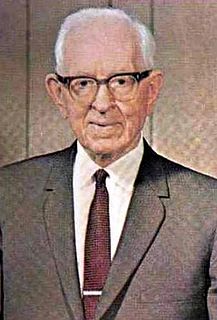A Quote by Richard P. Feynman
The situation in the sciences is this: A concept or an idea which cannot be measured or cannot be referred directly to experiment may or may not be useful. It need not exist in a theory.
Related Quotes
The brain, or cerebrum, is a material entity located inside the skull which may be inspected, touched, weighed, and measured. It is composed of chemicals, enzymes, and humors which may be analyzed. Its structure is characterized by neurons, pathways, and synapses which may be examined directly when they are properly magnified.
The phenomena in these exhausted tubes reveal to physical science a new world-a world where matter may exist in a fourth state, where the corpuscular theory of light may be true, and where light does not always move in straight lines, but where we can never enter, and with which we must be content to observe and experiment from the outside.
The belief that politics can be scientific must inevitably produce tyrannies. Politics cannot be a science, because in politics theory and practice cannot be separated, and the sciences depend upon their separation. Empirical politics must be kept in bounds by democratic institutions, which leave it up to the subjects of the experiment to say whether it shall be tried, and to stop it if they dislike it, because, in politics, there is a distinction, unknown to science, between Truth and Justice.
Many people think it impossible for guerrillas to exist for long in the enemy's rear. Such a belief reveals lack of comprehension of the relationship that should exist between the people
and the troops. The former may be likened to water the latter to the fish who inhabit it. How may it be said that these two cannot exist together?
CANNOT BELIEVE BOTH GOSPEL AND EVOLUTION. I say most emphatically, you cannot believe in this theory of the origin of man, and at the same time accept the plan of salvation as set forth by the Lord our God. You must choose the one and reject the other, for they are in direct conflict and there is a gulf separating them which is so great that it cannot be bridged, no matter how much one may try to do so.
I cannot believe that our factory system is the best mode by which men may get clothing. The condition of the operatives is becoming every day more like that of the English; and it cannot be wondered at, since, as far as I have heard or observed, the principal object is, not that mankind may be well and honestly clad, but, unquestionably, that the corporations may be enriched.
No thought, no idea, can possibly be conveyed as an idea from one person to another. When it is told it is to the one to whom it is told another fact, not an idea. The communication may stimulate the other person to realize the question for himself and to think out a like idea, or it may smother his intellectual interest and suppress his dawning effort at thought. But what he directly gets cannot be an idea. Only by wrestling with the conditions of the problem at first hand, seeking and finding his own way out, does he think.
Time, which measures everything in our idea, and is often deficient to our schemes, is to nature endless and as nothing; it cannot limit that by which alone it had existence; and as the natural course of time, which to us seems infinite, cannot be bounded by any operation that may have an end, the progress of things upon this globe, that is, the course of nature, cannot be limited by time, which must proceed in a continual succession.
When there are conflicts of observation, when experiments cannot be replicated, scientists may then retreat to a study of the various specific observations so as to explain the conflict, in the course of which they would make use of the concept of observation, or of some specification of that concept.



































